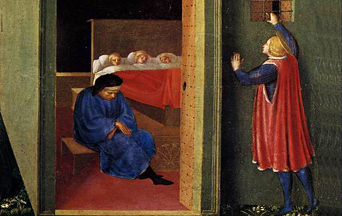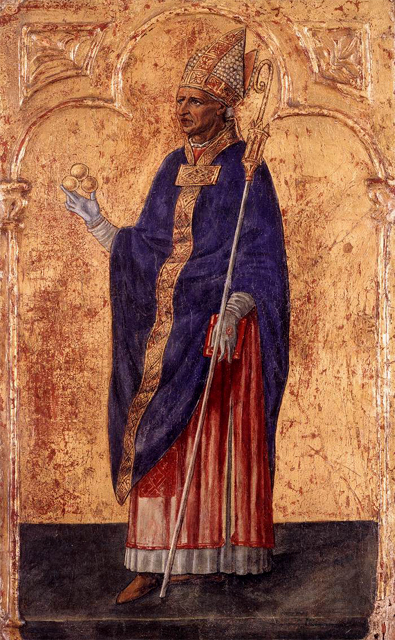
Saint John Vianney tells the story related below about Saint Nicholas. However, before telling his story, it would be better to give a brief introduction about Saint John Vianney for those who are unfamiliar with this great and humble saint.
Saint John Vianney is often known as the Curé d’Ars (parish priest of the town of Ars). He was born in Dardilly, France in 1786. He was three years old when the French Revolution broke out. As he grew, he witnessed the martyrdom of those priests, nuns, and laymen who remained loyal to Holy Mother Church in spite of the Revolutionary government that made the practice of Catholicism illegal. These martyrs, especially the priest, became his heroes.
The turmoil caused by the French Revolution interrupted his education. Later, he was drafted into Napoleon’s Army. Thus, he was not ordained a priest until the age of twenty-nine. His low status among his brother priests can be seen in his assignment to Ars, a village of 230 inhabitants.
Eternal and Natural Law: The Foundation of Morals and Law
He rapidly acquired a reputation as a fine homilist and confessor. The present story, “Saint Nicholas and the Three Girls” is paraphrased from The Sermons of the Curé d’Ars. The saint reflects on the evils of rash judgment by imagining the probable reaction of others seeing Saint Nicholas secretly giving his own money to three young women so that they would have a dowry. In an attempt to remain anonymous, Saint Nicholas tossed three gold balls into their home. The gold fell into their stockings, which were hanging to dry by the fire. This is the basis of the modern custom of placing small gifts in Christmas stockings. Saint John Vianney continues:
Rash judgments are founded on slight evidence. You might be mistaken. Here is an example of how easily we can be mistaken.What would you have said if you had lived at the time of Saint Nicholas and seen him coming in the middle of the night toward the home of three young girls, taking care that no one saw him? You would think him a great hypocrite. You would think that he was disgracing his high calling as a bishop.

Yet this bishop, who you would condemn, was a very great saint. To spare these girls the shame of begging, he threw money through their window so that their poverty would not draw them into sin.
Who Trusts in God Shall Not Be Confounded
This should teach us never to judge the actions of our neighbors without due reflection. Even then, we should only judge those for whom we are responsible as parents, employers, and so on. With others, we are nearly always wrong. I have seen many make such wrong judgments.
Are the judgments that we make about our neighbors any better than those that you would have made about Saint Nicholas?
Other people will have to render an account of their lives, but only to God.
Only our own sins are our business.
God will not ask us for an account of what others have done. Let us watch over ourselves and not take so much notice of what others do. Let us not torment ourselves and others by thinking and talking about what they do. That comes from a pride comparable to that of the Pharisee who concerned himself only about the acts of others instead of thinking about and weeping over his own sins.
Let us be content with saying, as King David said, “Lord, give me the grace to know myself as I really am, so that I may see what displeases thee, correct it, repent of it, and obtain pardon.”
Anyone who passes his time watching the conduct of others will neither know nor belong to God.
Science Confirms: Angels Took the House of Our Lady of Nazareth to Loreto
In telling profound truths in such simple stories, Saint John Vianney acquired a reputation that went far beyond the village of Ars. According to the Catholic Encyclopedia:
As early as 1835, his bishop forbade him to attend the annual retreats of the diocesan clergy because of “the souls awaiting him yonder.” During the last ten years of his life, he spent from sixteen to eighteen hours a day in the confessional. His advice was sought by bishops, priests, religious, young men and women in doubt as to their vocation, sinners, persons in all sorts of difficulties and the sick. In 1855, the number of pilgrims had reached twenty thousand a year. The most distinguished persons visited Ars to see the holy curé and hearing his daily instruction.
Saint John Vianney died in 1859. The Curé d’Ars was declared Venerable only twenty-five years after his death by Pope Pius IX, beatified by Pope Saint Pius X in 1905, and canonized by Pope Pius XI in 1925.
A fitting resolution for the New Year would be to avoid rash judgments and spend time with this great saint through the insights that he left for all.

